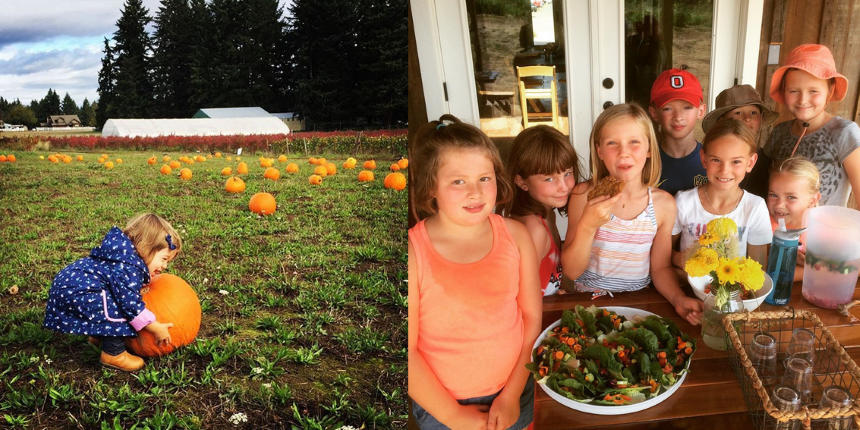Our Table’s vision is: A resilient and interdependent local food culture. The word culture is of great significance here. Wendell Berry famously wrote that "Eating is an agricultural act". He’s correct of course but eating is also a cultural act. Our cultural mores, habits, and preferences are critical factors in determining what and how we eat. In the past 50-odd years, advertising and mass media has become one of the primary driving forces behind defining food culture but perhaps it’s time for us as eaters to take that power back into our own hands. I would like to live in a world where communities even just fifty miles apart can have distinct food cultures based on their own ecology, heritage, and preferences. To build a resilient and interdependent local food culture, communities must first take ownership of their culture.
A few days ago, I read an article in the newspaper that made me really mad. The article noted that the use of the herbicide glyphosate (a.k.a. Roundup) has increased exponentially in the past decade. Despite recent research pointing to the toxic effects of glyphosate on human health and the environment, the government has responded by steadily raising the levels of glyphosate residues that are considered "safe" in our food. One of the fastest growing uses of Roundup is to desiccate a crop of wheat right before harvest – not to kill weeds but to kill the actual wheat plant itself so that it is easier to harvest...
It is time to call a spade a spade: Industrialized food (Big Food) is rife with deception and fraud. Most of us get overwhelmed with cognitive dissonance when confronted with the fact that our food is making us sick. It is impossible, as an average citizen, to police and cut through the marketing claims and jargon. Few have the energy or the time, and what starts off as principled vigilance soon slides into exhausted resignation. I am just as susceptible to this as anyone else. Although consumer choice can be a powerful motivator, it alone is not a sufficient solution because the problems are systemic and the system is rigged. Big Food, is based on the premise of taking ownership and control away from individuals and communities and giving it to large corporations and their enablers in government. Given the stacked odds, the only realistic way to change the system is to form interdependent personal relationships between eaters and food producers and take true ownership of our food.
What does it mean to take ownership of our food? How do we know that the farmer at the corner produce stand is any more trustworthy than the Big Food PR firm? Unless you live in a farming community and personally know your farmer, it is difficult to simply assume that small is good and big is bad – that’s definitely an oversimplification that can lead to more fraud. Clearly, the organic label, or any other label for that matter, is not sufficient either. Who has the time for all this, anyway? Our Table Cooperative was created as a way to address this conundrum. As a truly community owned food producer and seller, our basis is a web of trust and relationships between all the people involved in growing, raising, preparing, and eating food. All these people, from farmer to eater are financial and legal member-owners of the organization, an organization whose sole purpose is to serve the needs of its stakeholders. There is no corporate veil of secrecy to hide behind here. There are no hidden paymasters to service. Our Table gives its community control and ownership over the production and consumption of their food; as member-owners, those are our rights.
Along with these rights come certain responsibilities. As members, we have the responsibility to run the organization in a way that is consistent with its mission. A part of that is to produce the best food we can while caring for the people and land who make it possible. Another just as important part of our mission is to be financially self-sufficient and sustainable. This means that we have to price the food at what it actually costs to produce – we cannot hide costs under the table by pushing them out to unseen people or future generations. Often times, our food costs less than a similar item produced by Big Food. This is because our economic structure is non-extractive by nature and does not involve dozens of middlemen. This is especially true when you’re talking about seasonal locally grown raw ingredients that you take home and cook or prepare yourself. However, just as often, our food costs more than Big Food. This is not because our food is over-priced but because Big Food is too cheap. You are effectively getting what you pay for.
Yes, I am saying that we Americans need to spend a larger percentage of our incomes on food. Today, thanks to the cost-shifting tactics of Big Food, we spend less than 9% of our incomes on food – less than any other country in the world and less than any other time in our own history. At the same time, as a nation, we spend more on healthcare today than any other time in our history. There is a very direct connection between these two statistics. I think we all intuitively know this. You cannot separate food from health and you cannot separate the health of people from the health of the land and nature. It’s really as simple and beautiful as that.
Our Table’s consumer members are the bedrock upon which the rest of our Cooperative is built. These are the folks who not only buy into the philosophy behind the Cooperative, but are also willing to spend their hard-earned money on high quality local food. They take conscious ownership over their choice to value food over other things; a choice which can involve significant sacrifice and one that sadly not everyone in our community is able to make. Although nutrition support programs like SNAP and WIC can help (and we do accept them) they are not always sufficient. In addition, the 24x7 convenience of Big Food where a large red tomato is available any time of the year is difficult to turn away from.
Many of our members have children and it is always a special treat to have kids on the farm. Earlier this year we started offering educational programs on the farm. To date, we have held four week-long farm camps and hosted over a dozen field trips from area schools. The eager faces, curiosity, and joy of the kids serve as a grounding force – they remind us that we work today so that our children and grandchildren can reap the harvest of the future. It is with this spirit that in honor of National Co-op month, I would like to say thank you to all our members; people who have made the choice to own their food.


 RSS Feed
RSS Feed